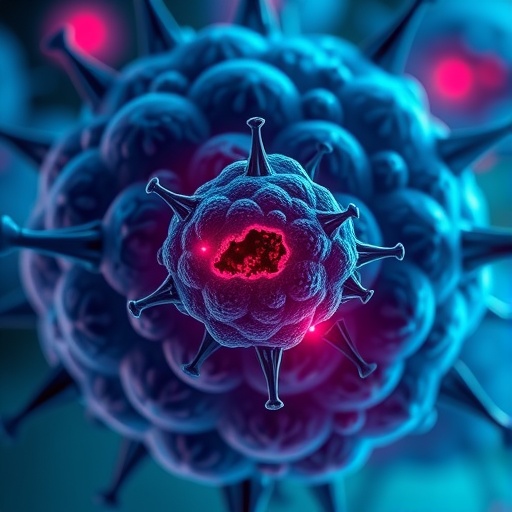Cancer cells have long been known to reactivate embryonic genetic programs to foster their uncontrolled growth. However, new research has uncovered a more nuanced mechanism by which malignant cells manipulate the cellular machinery that governs gene expression. This breakthrough study reveals that cancer not only reawakens developmental genes but also hijacks the protein editors — known as splicing factors — that determine how these genes are interpreted and translated, enhancing our understanding of tumor biology and exposing new therapeutic avenues.
Published recently in the prestigious journal Nucleic Acids Research, this research offers critical insights into the molecular choreography that underlies rapid tumor expansion and adaptability. Embryonic cells are characterized by their ability to proliferate swiftly and differentiate into a multitude of cell types, controlled by tightly regulated genetic programs that are silenced as development proceeds. Tumors, in a cunning parallel, revive these embryonic pathways to acquire a similar plasticity and growth capability, effectively granting themselves an embryonic-like identity.
The team at the Centre for Genomic Regulation (CRG) employed advanced molecular biology techniques combined with artificial intelligence-driven analytics to probe the role of splicing factors in cancer progression. These splicing factors are proteins responsible for post-transcriptional editing of RNA molecules—a process that rearranges segments of RNA transcripts to modify the final message encoded by genes. This RNA splicing is pivotal in enabling cells to diversify the protein products derived from a single gene, adapting their function to environmental shifts and developmental cues.
Under normal physiological conditions, splicing factors operate within a balanced network that ensures the generation of appropriate protein variants crucial for healthy cellular function. This equilibrium is meticulously maintained to prevent aberrant growth. Yet, the study uncovered that cancer cells disrupt this balance by selectively reactivating splicing factors typically reserved for early embryogenesis. The aberrant expression of these factors essentially rewires the cellular RNA editing landscape, driving tumorigenesis and conferring aggressive growth advantages.
Dr. Miquel Anglada-Girotto, lead author of the study, emphasized the strategic molecular mimicry employed by cancer cells. “Cancer doesn’t invent new tricks; it repurposes genetic programs designed for early development when rapid and flexible growth is required,” Anglada-Girotto explained. This exploitation of pre-existing cellular mechanisms provides the tumor with a robust framework for survival and expansion within the hostile microenvironment of the body.
The investigation further illuminated how oncogenic drivers, most notably the MYC gene, orchestrate a cascade of splicing factor deregulation. MYC, a well-known oncogene frequently activated in diverse cancers, disrupts the harmonious network of RNA editors by perturbing specific ‘initiator’ splicing factors. This disturbance triggers a domino effect, amplifying the activation of growth-promoting splicing factors while simultaneously suppressing those that ordinarily inhibit uncontrolled proliferation.
Such comprehensive rewiring of the splicing machinery fosters a cellular environment primed for malignancy. Combined with other genetic and epigenetic aberrations accumulating in cancer cells, this altered splicing network shifts the cellular state from regulated growth to unchecked proliferation. Dr. Anglada-Girotto described this transition as flipping the “entire system into cancer-mode,” a process that underscores the complexity and resilience of tumor cells.
Expanding upon the implications of their findings, the researchers proposed novel diagnostic and therapeutic strategies. Detecting early alterations in splicing factor activity could serve as a biomarker for the initial stages of tumor formation, offering a window for early intervention. Additionally, pharmacological targeting of key splicing factors might disrupt the interconnected network critical for tumor maintenance, producing ripple effects that stifle malignancy.
A pivotal component of this research involved leveraging artificial intelligence to analyze gene expression data and infer splicing factor activity. Traditional methods necessitated painstaking, resource-intensive examination of individual RNA molecules to identify splicing alterations. The AI model developed by the CRG team, however, can infer comprehensive splicing landscapes from broader gene expression patterns, enabling rapid and scalable analyses of existing datasets, and accelerating discoveries in cancer biology.
This innovative computational approach not only streamlined the detection of splicing factor dynamics but also unveiled previously hidden vulnerabilities in cancer cells’ gene regulation networks. By systematically scanning thousands of gene expression datasets, researchers are now poised to unravel the intricate molecular events governing tumor development and progression with unprecedented resolution and scale.
The study was conducted under the leadership of Dr. Anglada-Girotto with supervision from ICREA Research Professor Luis Serrano and collaboration with Dr. Samuel Miravet Verde at ETH Zurich. Their multidisciplinary effort combined molecular genetics, computational biology, and cancer research to produce a landmark contribution to our understanding of tumor mechanics and potential treatments.
In summary, this groundbreaking work elucidates how cancer cells repurpose embryonic RNA splicing programs to sustain rapid growth and evade regulatory constraints. Through AI-powered insights into splicing factor networks and oncogenic drivers like MYC, the research not only deepens our grasp of cancer biology but also charts a promising path toward early detection and targeted therapeutics, offering hope for more effective cancer management in the future.
Subject of Research: Cancer biology; RNA splicing factor regulation; embryonic gene reactivation; oncogene MYC role in tumor growth.
Article Title: Not specified in the provided content.
News Publication Date: Not specified in the provided content.
Web References: 10.1093/nar/gkaf855
References: Published in Nucleic Acids Research.
Image Credits: Miquel Anglada
Keywords: Cancer, RNA splicing, splicing factors, embryonic genes, MYC oncogene, tumor growth, artificial intelligence, gene regulation.
Tags: artificial intelligence in genomicscancer cell biologycancer research breakthroughsCRG research findingsdevelopmental gene reactivationembryonic gene expressiongene editing in tumorsmolecular biology of cancerRNA post-transcriptional editingsplicing factors in cancertherapeutic strategies for cancertumor growth mechanisms





